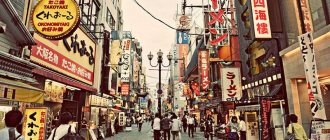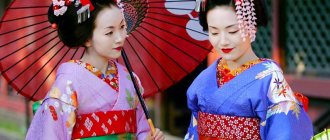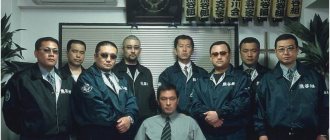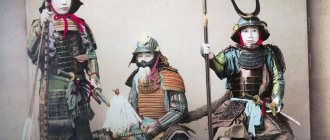All the hair-raising oddities of Japan!
From Masterweb
Japan is a very amazing country, unlike others. Do you want to know some facts about her that will shock you? Read!
- Valentine's Day in this country is a great way for a girl to tell the guy she likes about her old feelings. In Japan, it is girls who give Valentine cards and surprise guys. It’s very convenient: you don’t have to wait for the man to dare and come up first.
- Fruit prices are very high in Japan. For example, buying an apple will cost two dollars, and several bananas will cost five dollars. Fish and meat products, on the contrary, are cheap.
- Pornography in Japan can be purchased anywhere, even in a regular grocery store. There is always a shelf with press, where a separate place is allocated to hentai. In a bookstore, hentai is about a third of all products. If it's a large bookstore, then hentai occupies several floors.
- Hentai - anime with elements of erotica and pornography - is sold to persons under the age of majority, absolutely legally.
- The highest sales are for hentai about violence and sex with persons under the age of majority.
- The Japanese are not shy about reading hentai even on public transport, simply by putting the cover on the book.
- The Japanese subway has separate women's cars. They are launched during the busiest hours to prevent men from touching women in the crowd. And they really love to do this.
- Despite the above shocking facts, Japan ranks one of the lowest in the world in terms of rape rates. This figure, for example, in Russia is 5 times higher.
- Most Japanese characters contain two to four syllables. However, it can be much more complicated: the character 砉 contains 13 syllables and is pronounced “hanetokawatogahanareruoto”.
- The Japanese, even in the modern world, are very scrupulous in matters of honor. This applies to all areas of life and even politics. Several prime ministers have resigned after failing to fulfill their campaign promises to voters.
- Japan has a lot of the best. For example, the most expensive amusement park is located here. It's called Disney Sea. You can also find 4 of the tallest roller coasters here. The capital of Japan, Tokyo, has the most developed metro, the largest railway interchange point and the largest mixed intersection for pedestrians.
- A Japanese snowman is made exclusively from two snowballs, and not from three, as in the rest of the world.
- On Christmas, the Japanese love to go to KFC for fried chicken. The founder of the establishment, Colonel Sanders, is considered one of the symbols of this holiday.
- One third of all Japanese weddings to this day take place after matchmaking and viewings, which are organized on the initiative of the parents of the newlyweds.
- There are also northern cities in Japan with a lot of snow. Residents of these cities are incredibly lucky - the streets and pedestrian areas are automatically heated. The snow melts on its own. There is no need to remove it and sprinkle the paths.
- But even in northern cities there is no central heating. The Japanese warm themselves in their homes as best they can.
- In Japan, the official cause of death is recognized as overwork from work (Karoshi). Every year about 10 thousand people die for this reason.
- In Japan there is practically no ban on smoking in public places. The only exceptions are airports and railway stations.
- Japan still retains the title of Empire. Of course, formally. Today there is only one such country left in the world.
- Throughout the country's centuries-old history, Japan has been ruled by one dynasty. The current Emperor Akihito is a direct descendant of the first emperor, who was the founder of the state.
- Japan is 2671 years old today.
- The Japanese's favorite topic of conversation is food. Even when they eat, everyone talks about taste preferences. It is considered bad form not to say “delicious” even once during dinner.
- The Japanese love to repeat themselves. Among young people, this is considered kawaii - that is, cute, adorable.
- Not only are kanji not easy to understand, but Japanese writing is divided into three types: Hiragana (a syllabary system for writing Japanese words), Katakana (a syllable system for writing borrowed words) and Kanji (writing using kanji).
- There are no immigrant workers in the country. The problem of cheap labor is solved very simply: the minimum wage that can be paid to a foreigner is higher than the Japanese wage. This means that only qualified specialists can come to work. Our country could also use such a decision.
- Most of the railways in Japan are privately owned.
- Emperor Hirohito was never removed from power; after the war, he led the reformation and ruled until 1989. His birthday is considered a national holiday and is celebrated on April 29.
- Japan's most famous mountain, Fuji, is the private property of Hongyu Sengen Temple. The mountain was transferred to the temple in 1609. Japanese court in the 80s. The 20th century confirmed the legality of transferring the mountain by deed of gift. No one can trespass on private property in Japan. This is strictly punishable.
- The Japanese language is divided into several types depending on the degree of politeness: colloquial, respectful, polite and very polite. Women use a respectful look, men use a conversational one.
- In Japan there is a word called "Hikkikomori". It refers to people who have voluntarily isolated themselves from society and become asocialized. They often do not work, live at the expense of relatives and may not leave the house or even their room for years. 7% of the Japanese male population are Hikkikomori.
- Months in Japan do not have names like ours. Therefore, January is the first for them, February is the second, etc.
- Until Western trends penetrated Japan, the Japanese knew only one expression meaning sympathy, feelings: “koi”, translated: “an irresistible attraction to something unattainable.”
- Japan's population is predominantly ethnic Japanese - more than 98 percent. This is very rare for modern countries.
- Prisoners are not allowed to vote in elections in the country.
- The Japanese eat dolphins. They cook soup from them, make barbecue, and eat them raw. According to them, the dolphin does not taste like fish and has tender meat.
- The Japanese language has one unique feature: it has almost no personal pronouns, and those few pronouns also have other meanings. So, the pronoun “I” means directly “I” and plus “private”, “personal”.
- Tokyo is such a safe city that small children of five or six years old can ride the subway and buses without adults. Perhaps this is the safest city in the whole world.
- The Japanese have a fear of travel because they are afraid of everything outside their country. The most dangerous country, according to the Japanese, is the United States of America.
- The Japanese constitution does not allow its state to have an army and participate in wars.
- Studies in Japanese schools begin on April 1 and have 3 terms. Students go to school from April to July, then have a rest until September, then study until December and from January to March.
- All garbage collected in the country is sent for recycling. Because of this, waste bins simply do not exist. The waste is separated into glass, that which can be burned can be recycled and that which cannot be burned. Each species is exported on a certain day of the week. If a Japanese person violates these rules, he faces a fine of $1,000.
- You won’t find trash bins in the city either, only bins where you can throw away bottles. And it’s clean on the streets. I wish it were the same for us.
- It is believed that every Japanese person must earn enough to live in a comfortable old age, so pensions in the country are very small - no more than three hundred dollars. This is given the fairly high prices for food and transport. Pension insurance is also not provided for by the country's legislation.
- Godzilla was called Godzilla for a reason. In Japanese it sounds like Gojira - a mixture of the words Gorilla and Kujira (whale). This was probably not easy to come up with.
- Public transport in the country is not cheap - you can ride the metro for at least 50 rubles in our money.
- Men in Japan always come first. In any establishment, store, or restaurant, they will say hello and take orders from males first.
- The Japanese love jeeps, despite the high traffic density. Even in densely populated cities where there are traffic jams, there are very few sedans on the road.
- All toilets in Japan have many functions: from heating the toilet seat to simulating the sound of running water (in case you need to mask unpleasant sounds). The Japanese toilet is a whole spaceship with a bunch of buttons.
- Every Japanese person knows that the cute cartoon pussy Hello Kitty comes from England.
- You should never leave a tip in Japanese establishments. They are tantamount to a handout. As long as you pay the original price, you remain equal to the seller.
- They don’t know what racism is in Japan. You will never see it on the street. And isn't that great?
- One of the popular channels in Japan is showing a series about 2 birds with one stone, Putin and Kiriyenko. In the story, they are trying to survive in a police state.
- The age of consent in Japan, that is, the age at which a person can give permission to engage in intimate relations with himself, is thirteen years old.
- Japan is three times larger than England in area. The area of Japan is 374,744 km², and England is 130,410 km².
- Japan is often called an overpopulated state. This is an incorrect statement, since its density per 1 sq. km - 360 people. In England, for example, per 1 sq. km there are 383 people.
- The terms "irregular" and "different" are both represented by the same word 違う (chigau) in Japanese.
- For several years now, things have existed in the country that we previously only saw in science fiction films. These are vending machines with all kinds of products, futuristic trains, strange fashion. All this gives Japan a unique flavor.
- There are quite a lot of deep, deep words in the Japanese language. For example, the word 御来光 (goraiko) means the sunrise as seen from Mount Fuji.
- The Japanese have often been considered a superior race throughout history. Thus, Hitler himself, admiringly, called them “honorary Aryans.” In South Africa during apartheid, only the Japanese were not discriminated against because they were called “honorary whites.”
- If an emergency occurs in the country, every Japanese phone starts beeping loudly, even if it was on silent mode. Plus, a message comes with information about what happened, as well as further evacuation plans.
- The Japanese don't know what looting is. Empty houses will remain untouched. No one will ever plunder them. This causes genuine surprise among all foreigners.
- It's not easy to find a Japanese person who speaks English. At the same time, they often use Anglicisms in their speech. But these words will also be difficult to understand, since the Japanese have their own original pronunciation.
- In the Russian language there are words borrowed from Japanese, for example: “cotton wool”, “pollock”, “iwasi”, as well as the well-known “tsunami” and “typhoon”.
- The Japanese, in turn, also borrowed some words from the Russians: “ikura; caviar" and "noruma; norm”, as well as the phrase: “wu people; to the people,” which came into use after Alexander the Second.
- In Japan, there is still such a punishment for a crime as the death penalty. So, recently this type of punishment was applied to 8 criminals in a year.
- Apparently, the previous fact allows Japan to remain the country with the lowest percentage of murders and crimes committed with the use of violence. In addition, the Japanese are a long-lived nation. They are absolute record holders for average life expectancy.
- In the heart of Japan, Tokyo, lies the huge gay district of Shinjuku-Ni-Chome. It has the largest concentration of gay bars in the world.
- The characters in China and Japan are almost the same. There are some differences, but knowing Japanese, you can read simple texts in Chinese, for example, signs on the streets.
- The Japanese do not sign documents. Each of them has a special seal, which they affix instead of a signature every day. You can purchase the stamp in a regular store.
- If the train is delayed for even a minute, it is already considered late. Have you seen this in any other country?
- If you are given a gift in Japan, do not rush to open it. This is considered bad manners. You just need to say “thank you,” and you can only open it at home alone with yourself.
- In Japan, it is customary to smile even if you are in great pain. A smile should hide all inner feelings.
- If the Japanese are fired up with an idea, then rest assured that they will finish the job they start and do it flawlessly and tastefully. For example, in French restaurants in Japan you may be served a menu in French, in Italian restaurants - in Italian. Signage and decoration will also be country specific. But in this case, don’t look for English text there.
- The Japanese take the institution of property very seriously. It is in this country that you can find establishments that are several hundred years old. Moreover, the owners from generation to generation are the same family. Thus, the Hoshi Ryokan Hotel has been operating since 718 and has the same dynasty of owners.
- Tanuki are willful Japanese werewolf animals that bring happiness and good luck. Their eggs are a traditional symbol of well-being. For the mythical happiest tanuki, the area of the eggs should be 8 tatami, that’s 12 m. If misfortune comes, they pay with them.
- More than half of Japan's territory is covered with forests. However, cutting down trees for commercial purposes is strictly prohibited. The country uses wood that comes from tropical forests.
- From 1992 to 2002, the country helped other states more than any other country in the world. We are talking about international humanitarian assistance.
- The ticket taker on the train, before looking at the tickets and passes, bows and removes his headdress in front of the passengers. You can learn politeness from the Japanese.
- The secret that makes Japan unique, unlike other countries, is simple: centuries-old traditions and modern Western trends are harmoniously combined here. The Japanese honor their culture and carefully preserve the past, but at the same time keep pace with the present.
- Well, there is one last, almost indisputable fact left: Japan is the best country in the world!
Many facts may seem shocking to us. Be that as it may, Japan is a rapidly developing country, with a minimal crime rate and a fairly high level and life expectancy. Most countries, including ours, have a lot to learn from the Land of the Rising Sun.
The Japanese and their oddities
Everyone knows that the Japanese are very difficult people and the authors of the most strange, incredible and crazy ideas. Alas, our mentalities are so different from each other that most often Europeans simply do not understand the creative inventions of the Japanese. But, be that as it may, no one will accuse them of hackwork - their research is always of high quality. Today you will see a selection of various amazing oddities that are inherent in this particular nation.
1. Such videos blow the minds of unprepared Internet users. These acidic colors, like music, are very characteristic of the Japanese - this can be seen from the advertising, which ends up in the world's treasure trove of videos on this topic. Why put up with native advertising if Japanese advertising leaves a strange and incomprehensible aftertaste in your soul. An example of such work is an advertising video telling about the delights of a popular brand of lollipops.
2. Anime. Even ordinary Japanese cartoons are absolutely extraordinary. How do you like the cartoon Mawaru-Penguindru, which tells how guys take their little sister to a zoo with an aquarium where penguins live, and after visiting the establishment they buy the girl a hat with a picture of a bird. The girl, who was sick, died in the evening of the same day, but is immediately brought back to life with the help of the spirit that lived in the hat. To save her life, you need to find a penguin drum with the support of these three birds of different breeds. Only the girl's brothers see them. And after all, more than twenty episodes of this cartoon are quite popular among Internet users.
Cartoon penguins.
3. Yakuza. The Russian mafiosi still have time to grow to match the Japanese ones, despite the fact that the latter do not have tattoos with domes. The Yakuza are small groups that exist in considerable numbers under a serious hierarchy. The position of the head of the clan, who is called “kumicho,” is passed on from father to son, and this chain has not been broken for centuries. Disobedience is severely punished; phalanges of fingers are often cut off to atone for guilt. There is also a place for seppuku (we know this concept as “harakiri”).
Although small, they are yakuza.
4. Gadgets from Japan. They are truly multifunctional and well thought out; most of them are developed in this country. What do you think, for example, of the Japanese Sharp smartphone, which should hit the market early this month? This is exactly that component of Japanese culture that is not crazy, but surprisingly reliable and of high quality and accuracy. This gadget not only has a surprisingly organic design - it also has a five-inch multi-touch screen with a resolution of 1920 by 1080 pixels and many interesting and useful functions. Also in Japan they make very good clothes, if they are not too marinated in the bright imagination of the designers. If you know the places and buy quality items there, such as RASH children's knitwear wholesale, you can satisfy the taste of the most picky consumers. The main thing is not to get too carried away with creativity - not everyone will be able to understand it.
In Japan, this device is more popular than Samsung, Nokia, HTC and Apple. The gadget has an excellent spacious battery, a dual-core processor and two gigs of RAM. The cost of a smartphone is about 22 thousand rubles.
Sharp Aquos Phone SH930W.
5. The military-industrial complex also does not stand still. Robotics is actively developing in Japan, and by leaps and bounds. In case of war, this nation will be able to stand up for itself.
A four-meter robot with hydrocannons.
7. Everything is excellent in Japanese literature too - it is surprisingly versatile and diverse. But, often it is too pedantic for European minds. There is a novel by Junichiro Tanizaki called “Snowy Landscape” - it is as difficult to understand as it is to pronounce the author’s name. In the 600-page work, the entire plot is based on an attempt to marry off his daughter, who is already ripe for this.
Traditional Japanese family.
8. Those who get the brightest emotions from watching fights without rules should definitely visit Japan. It is there that they are absolutely unprincipled and terribly cruel. Just remember the fight between Satoshi Ishii and Fedor Emelianenko. True, Satoshi was unlucky then - he was almost left without ears.
9. Japanese freaks are the freakiest in the world. Local youth protest against the conservative regime so much that it is impossible not to notice it. For example, how do you like a bagel in your forehead, which is called a bagel head? In order for the head to become donut-shaped, a saline solution is poured under the skin of the forehead, which is then given the desired shape. After a day, the effect disappears, and scientists do not yet know where the solution goes. Surely it goes straight to the brain in order to further influence the center responsible for the desire to modify the body.
Japanese freaks.
10. Japanese music is a completely incomprehensible set of sounds to our ears. How do you like the song Kyary Pamyu Pamyu, which talks about how important false eyelashes are for changes in life?
The Japanese have even more shocking things: A dish that may shock you
Top 25 weird things that only exist in Japan
Japan is a country with a unique culture
and a very strict code of etiquette.
There are certain ways of eating noodles, there are also rules for how to accept gifts, even certain traditions that must be followed so as not to offend the owner.
This is a whole complex of rules and customs
, which may greatly surprise those traveling to Japan.
That's why we've compiled a list of some of the things that foreigners find most strange when visiting the country. The Japanese have certain habits
that we cannot understand.
Here are 25 traditions and habits that you should know about if you are going to visit the land of the rising sun.
1. People avoid the number four or have tetraphobia
In Japan, the number "four" is avoided because it means "death."
.
The number thirteen can be considered synonymous with this number in Western culture. The number four brings bad luck
and is used as little as possible. When intending to congratulate someone, you should not gather in a group of four people. A gift received from four will arouse suspicion and superstitious fear.
When going up in an elevator, there is a high chance that you will not see a button for the fourth floor. And in skyscrapers, floors from 40 to 49 are not marked. The number 49 is extremely unlucky as it means “deadly pain.”
Fear of the number four
or avoiding it by any means is called
"Tetraphobia"
and is common in many regions of East and Southeast Asia.
2. Don't blow your nose in public.
The Japanese will consider you uncultured
and just a disgusting person if you blow your nose in public. More often than not, locals are held back in search of a secluded place.
If you need to blow your nose, try to do it as quietly as possible.
and more inconspicuous.
Also, the Japanese do not use handkerchiefs.
3. Tipping may offend the wait staff.
What has long become a habit for us can be considered not only rude, but also humiliating among the Japanese. Tipping can be confusing. After that, he will try to find you and return the money.
If you really liked the service in a particular establishment, it is better to leave a small gift
.
4. It’s rude to eat while walking.
Of course, it is very convenient to eat while you are going somewhere. This is common in many Western countries, but in Japan this behavior is despised
.
It is also considered indecent to eat on a train.
or public places.
But there are a few exceptions to the rule. You can easily buy yourself some ice cream and enjoy it while walking. This is not considered a violation.
5. People who push you around in a crowded subway car.
Osiya or pushers
– people who wear a uniform, white gloves, and a hat.
Their duties include pushing passengers aside
to ensure that no one is pinned in the doors or in need of assistance.
6. People on trains may fall asleep on your shoulder.
If someone in Japan fell asleep on your shoulder,
then you should not be surprised, since this is considered
common
in this country. You need to be patient and wait for your neighbor to finally wake up.
The journey to work takes a lot of time, plus the Japanese work very hard, so at the end of the day they are extremely tired and can accidentally fall asleep.
Residents are already accustomed to this.
Japan is so weird
Japan is very different from other countries.
To make sure of this once again, we suggest getting acquainted with 15 oddities that you can encounter when visiting this wonderful country. Hotels of love
These are hotels where rooms are usually rented for a couple of hours and are intended for couples in love. They are becoming increasingly popular in Japan, where privacy is at a premium. According to statistics, 2% of Japanese visit such hotels daily.
Love hotels are usually easy to spot by offering two different room prices: for holidays and for overnight stays. The name and presence of heart symbolism is also a clear sign of such places. They are usually located near railway stations, near highways or in industrial areas.
While the cheapest love hotels will be quite basic, upscale establishments can offer extravagantly decorated rooms, often with whimsical themes, and with costumes available for rent. In addition, rooms sometimes feature swivel beds, ceiling mirrors, karaoke and neon lighting.
Inemuri
While in other countries you can get a reprimand for sleeping on the job, in Japan this is treated differently. In Japanese business culture, employees who work virtually overtime are not prohibited from taking a nap at work. They even came up with their own name for this - inemuri. True, you need to adhere to certain rules. First, you need to remain upright at all times. And secondly, you must be ready to return to work at any time.
Maid cafe
If you want pretty girls in maid costumes to serve you while you sit in a cafe, then head to the Akihabara area, where you can easily find a maid cafe.
Slurping while eating noodles
Japan is a country known for its extremely polite manners. However, one feature may seem strange to Westerners. So, when eating noodles, in the Land of the Rising Sun it is customary to slurp. With chopsticks in one hand and a spoon in the other, you should ideally eat your ramen hunched over the bowl. At the same time, slurping shows that you are getting maximum pleasure from food.
Double tooth (yaeba)
Unlike most countries in the world, Japanese youth spend significant amounts of money to have uneven teeth. The phenomenon has been dubbed "yaeba", which translates to "double tooth", and is one of the latest strange fashion trends in the country.
Cuddle cafe
The first Soine-ya (meaning "sleep shop") opened in Tokyo three years ago. Its peculiarity is that here male clients can sleep next to a girl for a fee. At the same time, any intimacy is strictly prohibited. However, other additional ones are available (costs 1000 yen) or “stroke a girl's hair for three minutes” (costs the same). You can find Cuddle cafe in the Akihabara area.
Naked festivals
Hadaka Matsuri is a bizarre festival that involves thousands of Japanese men taking off their clothes in public. This is done because a naked man has a greater ability to absorb evil spirits. Only the most intimate parts of the body are covered with fondosha.
Ganguro
Ganguro, which literally translates to “black face,” is a fashion for girls to have extremely tanned faces. To do this, they dye their skin as dark as possible every week, and then apply a huge amount of foundation. Black ink eyeliner, platform shoes and bleached hair are also essential attributes of ganguro.
Restaurant Mr. Kanso
This is a surprisingly popular Japanese restaurant that only serves canned food. Instead of ordering from a menu, diners choose food directly from shelves stocked with canned goods. And plastic is used as cutlery.
Ghost Island
Located about 15 km from Nagasaki, Hashima Island was used as a coal mine between 1887 and 1974. The maximum number of residents (5,259 people) was recorded here in 1959. Thus, the population density of the island at that time was 216,264 people per square mile. However, when oil replaced coal everywhere in the 1960s, Hashima was abandoned. Today it is better known as "Ghost Island". A small part of the island was opened to tourists in 2009, and since then boat tours have been frequented here.
Kancho/Kancho
"Kancho" is a common joke played by Japanese children. To do this, the hands are folded in the shape of a pistol, and the thumbs are raised up. After this, you need to sneak up from behind, unnoticed by the victim, and shout “Kancho!” stick your index fingers into her anus. The name of this fun comes from the Japanese word "kancho", which translates as "enema".
Toilet slippers
To minimize contact between the “dirty” toilet floor and the clean floor of the rest of the house, the Japanese wear special toilet slippers when entering the restroom. They are always placed at the toilet door and must be removed when leaving the toilet.
Hiding thumbs
A common Japanese superstition says that if a funeral hearse passes by, you should hide your thumb in your fist. The Japanese call the thumb the “parent finger,” and hiding it means protecting the parents.
Opening gifts
When receiving a gift, the Japanese are embarrassed to open it immediately until there is an invitation to do so. In the past, the Japanese generally did not open gifts in the presence of the giver. It is also very important to carefully unwrap the gift, being careful not to tear the wrapping paper.
The shortest escalator in the world
The world's shortest escalator is located in the basement of More's department store in Kawasaki. It only has 5 steps and is about 80 centimeters high.
<Popular bag brands in Japan
Japanese horoscope and Western zodiac: similarities and differences>
Special slippers for the bathroom
When entering a Japanese home, restaurant, temple, museum or art gallery, you will be asked to change into slippers.
special slippers are used for the bathroom
– toilet slippers, that is, you will need to change your house slippers to these if you want to go to the bathroom.
8. You should come to visit with a gift for the host.
It is considered a great honor to be invited into someone's home. If this happens to you, then don’t forget to bring a present for the owner.
The gift must be beautifully decorated and well packaged.
If you receive a small gift, then you should not refuse
From him. Although at first, of course, you can be indignant and pretend that you cannot accept such a gorgeous gift.
9. Pouring your own drink is considered rude.
In the United States and many other countries, guests are treated to drinks first, and then themselves. In Japan, you should never pour the drink yourself.
. You can look after others, at which point the guest will see that your glass is empty and take care of you.
You can't drink until someone says "Kanpai" - yay.
10. Eating noodles while smacking your lips
It's not only considered polite
, but also means that you really liked the dish. If you do not eat loudly enough, you will offend the cook, as he will think that he prepared bad noodles.
Slurping while eating noodles is necessary not only for the sake of politeness, but also in order not to burn your tongue
. Japanese soup and noodles are served very hot, meaning your tongue can easily be scalded, and slurping helps cool the food.
Uncultured
Belching at the table is considered.
They use special toilet slippers
In hotels and homes, the Japanese use separate plastic or rubber slippers for the toilet and bathroom. They usually stand at the entrance to the bathroom. When you go out, the flip-flops should be taken off and left in the same place. This strange tradition has two purposes: firstly, the Japanese believe that it is more hygienic, and secondly, it is immediately clear that the toilet is occupied. This rule often confuses foreigners, who, of course, always forget to change their shoes.
By the way, visiting street toilets is also often surprising. They look unusual in appearance, and inside they are equipped with the latest technology. For example, here you can turn on music so that others certainly cannot hear what you are doing there. There is also a special button to call the security service in case the client becomes ill.
Capsule hotels the size of coffins
Capsule hotels
used by those who want to pay a little and get some sleep. Most often they are used by businessmen or those who stayed late and missed the last train to their home.
The sleeping quarters are small capsules
, which are slightly smaller than a coffin, and the beds are stacked next to each other. The idea of creating such hotels has existed in Japan since the 1970s, but over time, other countries have become interested in building such hotels.
There is only one drawback to this hotel. A capsule is a closed space, so people with claustrophobia will not be able to spend the night in such hotels.
12. Naki Sumo - Festival of Crying Children
Naki Sumo is one of the weirdest festivals we've ever heard of. Two sumo wrestlers compete in this competition
, each of whom is holding a child in his arms.
The judge then puts on scary masks
to make the children cry.
The loudest and longest cry is the winner. This 400-year-old tradition is said to have a positive effect on children's health.
The festival is usually held in May
at Sensoji Temple in Tokyo.
If you are planning to visit this city, then do not miss the Naki Sumo festival.
Throwing soybeans during Setsubun
© Liquidlibrary/ Photo Images
Setsubun - Japanese festival
, which is celebrated on the penultimate day of winter.
The Japanese believe that during this period evil spirits rise
.
Parents all over Japan then put on a Hannyu, a mask, and try to scare their children. In return, these children have to throw roasted soybeans to scare away the demons
.
15. Shukatsu Festival - funeral festival
Many of us drive away thoughts of death, but the Japanese acted differently; they came up with a festival in this honor. Shukatsu Festival in Japan teaches people about the inevitability of death
and teaches how to prepare for it.
You attend various psychological classes and are also asked to take a place in a coffin. You can even use makeup to turn yourself into a dead man.
The Japanese believe that all these activities will help people relate to death more easily.
Hadaka Matsuri - nudist festival
The madness of the Hadaka Matsuri in Okayama is seen by 9,000 people wearing only loincloths.
Every year, the priest throws a pair of lucky sacred sticks out of the window into the crowd. Then the crowd must fight for these sticks, and whoever gets them must throw them into a wooden box. Then they will be happy all year long
and luck will be on their side.
18. Akutai Matsuri - festival of curses
While most of us are punished for using swear words, in Japan there is a festival where swearing is required.
The Akutai Matsuri is overseen by 13 priests dressed as Tengusa, mythical demons who climb Mount Atago. Along the way, people are encouraged to insult these demons and try to steal their offerings in order for you to have good luck.
Even if you don't know how to swear in Japanese, you can join in the fun and insult evil spirits
in English or Russian!
19. Super weird game shows
Japanese game shows can be downright crazy
, and some are so inadequate that they cannot be shown in any other country.
These game shows often put contestants in humiliating situations
. They can be extremely strange.
For example, in one game show in which one object in the room is replaced with a similar chocolate object, contestants must try to find it by biting the objects. They are also considered disgusting because the items may contain questionable ingredients.
. The game can even be intimate with explicit scenes.
Japanese game shows have managed to include almost every weird thing on the planet.
20. The most technically equipped toilets in the world
We spend a lot of time in the bathroom, so why not make this place more comfortable.
Japan has become the world's leading toilet innovator and is now famous for its sophisticated "smart toilets"
.
Forget about those toilets that you have been accustomed to since childhood. A Japanese toilet will block out various unpleasant sounds, spray air freshener, automatically raise your seat, heat the seat, play music or have a built-in bidet.
It is not surprising that many tourists do not immediately understand how to use this miracle of technology.
21. Ice cream that doesn't melt
Culinary scientists in Japan have invented ice cream bars that don't melt.
.
While experimenting with strawberry chemistry to help farmers affected by the 2011 tsunami, these scientists accidentally discovered
a chemical that hardens almost instantly. Ice cream made from this composition may not melt for five minutes while a hair dryer is placed opposite.
The composition did not affect the taste of the product in any way, so you can enjoy a cold dessert without getting dirty.
22. Is the traffic light blue - or is it green?
Almost everywhere, red means that a person must stop, and green that he can cross the road. But what if in the country you are visiting, green also means blue?
Take a trip to Japan and you'll notice the green, turquoise and aqua lights.
and all this is due to
the linguistic peculiarities
of the Japanese language. While there are now separate terms for blue and green, in old Japanese the word "ao" was used for both colors. In modern Japanese, the word "midori" means "green", but in official literature the lights are still called "ao".
Even though international traffic law requires all "go" signals to be represented by a green light, Japanese linguists objected to their government's decision to continue to use the word "ao" to describe what was clearly "midori". The government decided to compromise and obliged traffic lights to use the bluest shade of green.
- technically green, but blue enough to be called "ao".
23. Kawaii culture and love for everything cute
The word “kawaii” comes from a phrase that means “shining face,” which in turn refers to the blushing of an embarrassed person. Over time , the meaning has mutated to the modern "cute"
and the way it is written in Japanese literally translates to “to be loved.”
Kawaiiness is one of the most valuable attributes of this country.
24. Human soup? Noodle shower
In Japan, there is a centuries-old tradition associated with the bath. You might think that this is not unusual, since baths are used in many countries. However, the Yunessun Spa Resort in Hakone has kept the tradition and given it a little twist.
.
Imagine: bathing in a vat of pork soup and noodles.
“Recently, people have become very concerned about maintaining delicate skin, but everyone knows what the effect of collagen, which is contained in pork broth, is. In this bathhouse, everyone can have fun and benefit from the beneficial properties of the noodles,” says spa owner Ichiro Furuya.
If you don't like a broth bath, you can take a bath with sake, green tea, and more.
25. Crooked teeth are fashionable
Anyone who has faced abuse for wearing braces will understand that straight teeth are worth their weight in gold.
Uneven teeth are considered fashionable in Japan.
Most girls try to acquire such teeth, for example, by gluing tooth attachments.
But if you want to change the shape of a tooth, it will cost a pretty penny.
fashionista.
Japan lived in isolation
, therefore, many aspects of culture developed without the influence of external influences.
No wonder Japan is pretty tolerant of weirdness
, since they have their own concept of strangeness.
Epson employee says
There is a stereotype that Japan is a good place to work. This stereotype comes from our compatriots who work by invitation in foreign companies, where the Japanese try to adapt to the level and style of foreigners. Meanwhile, in the Land of the Rising Sun itself, the traditional work system is structured in a very unique way, and it is quite difficult to exist in it. That is why there are not many foreigners building a career in classic Japanese companies. Epson employee Marina Matsumoto talks about what it’s like for the average office worker in Japan.
Dress code
Of course, the conditions depend on the specific company, but in principle the dress code in Japan is much stricter than in Russia. Failure to comply with its rules has serious consequences for the employee, including immediate dismissal.
In a traditional Japanese company, a mandatory black suit is worn regardless of the weather, even if it is +40 outside. The Japanese tolerate both heat and cold calmly, as they go through a very harsh school of hardening the body in childhood. Recently, a new law was passed allowing people to wear short-sleeved shirts to work. This is due to the forced saving of electricity, in which even in extreme heat air conditioners are no longer always used in offices.
In some companies, women are not allowed to wear fitted suits - they must be completely straight. The skirt must cover the knees.
Women's accessories are also prohibited. I have a large, serious company, it is known internationally. But I work where mostly Japanese work. At the workplace I was only allowed to wear a cross - under my clothes so that it would not be visible - and a wedding ring.
Makeup should be invisible. Japanese women love to wear bright makeup, their cheeks are very rosy, and almost all of them have false eyelashes. But at work, a woman should be as unattractive as possible to men.
In some places, women must only wear short hair that does not cover their ears. Hair color must be black. If you are naturally blonde, for example, you will have to dye your hair.
In addition to long hair, men are not allowed to wear a beard or mustache. This is an unspoken rule that everyone knows. The persistent image of the Yakuza (this is a traditional form of organized crime in Japan) gets in the way.
Subordination
When I got a job, I signed a bunch of documents, where I assured that I would not discuss anything with clients and colleagues except work: neither the weather, nor nature. I don’t have the right to share my “personal data” at work - who is my husband, how are I doing... At home I don’t have the right to talk about my work. My job is not secret, but it is customary and stated in my contract.
At work they only work
They only take to the workplace what they need for work: for me, these are documents and a pen. I can’t take my bag, wallet or phone; it remains at the checkpoint.
In Russia there is a favorite saying: if you’ve done your job, go for a walk. In the Russian workplace, the main thing is that you complete the plan for today. In Japan, no one is interested in “plans for today.” You come to work and have to work at it.
How the Japanese slow down the work process
In Russia, we all know that your salary depends on the results of your work. If you work poorly, you get nothing. If you work well, you get bonuses and promotions. You’ve done everything - you can leave early or ask for an additional task to earn more.
In Japan you pay by the hour. Almost all Japanese people take overtime. But this often results in them stretching out one task that can be completed in two hours over a week. The deadlines set by the company also do not always correspond to the level of complexity of the work. The Japanese will poke around for hours, it seems to us that they work like sleepy flies, but they think that they do the work “thoroughly”. They incredibly slow down the workflow, so it’s difficult for us to work with them.
And this, by the way, is one of the main reasons why their economy was not in the best condition. They have trapped themselves with this hourly payment system. After all, in essence, work is designed not for quality, but for the number of hours spent in the office.
Long, lengthy conversations
We all know that brevity is the sister of talent, but in Japan, brevity is short-sightedness. The Japanese cannot speak briefly and to the point. They launch into long and extensive explanations, which are aimed at ensuring that even a narrow-minded person understands what they are talking about. Meetings can last an incredible number of hours. The Japanese believe that if they talk for a long time and in excessive detail about the same thing, then they respect the interlocutor.
Stratification of society
Growing rice requires a lot of work and organization. Therefore, historically, Japan has developed a system with a very narrow specialization of labor and strict stratification of society. Everyone has their own responsibilities and their place in the life and production process.
Japanese communities have always been clearly organized. For example, a samurai never prepared food for himself; he could easily have died of hunger if the peasantry had not helped him out.
As a result of this mentality, it is very difficult for any Japanese to make an independent decision that is not inherent in his status. They cannot take upon themselves basic responsibility that somehow goes beyond the scope of their everyday routine. To put a comma or not to put it is a problem for half a day. Preparing basic documents is a series of endless, very slow consultations. Moreover, the mandatory nature of such consultations is amazing. If an employee nevertheless takes it upon himself to make a decision that is not based on his status, then everyone in the hierarchical chain associated with him will receive a reprimand. This is eastern despotism in action: “I am a small man, I am a simple peasant, and I should only do the work assigned to me.”
Again, everything is understandable: Japan is a small country with a large overpopulation, it needs strict frameworks and rules. To survive in Japan, you need to clearly know: my border is here, and this is the border of another person, I must respect it. No one goes beyond their limits. If a Japanese man marries them, he will literally be lost.
Russia has a huge territory, vastness, and open spaces. We are not constrained. We are free. A Russian person can do whatever he wants. And the Swede, and the reaper, and the player on the pipe - this is primarily about us, Russians!
Same as everyone else
Interestingly, in Japan you are not supposed to demonstrate your difference or superiority in mind. You cannot show your uniqueness, specialness. This is not welcome. Everyone should be the same. From childhood, uniqueness is burned out there with a hot iron, so Japan will not give the world either Einstein or Mendeleev.
Famous Japanese technology is a myth. As a rule, these are ideas that were not created by the Japanese. What they are good at is deftly picking up and improving on time. But we, on the contrary, can brilliantly create and forget...
To survive in Japanese society, you have to be just like everyone else. In Russia it’s the other way around: if you’re the same as everyone else, you’ll get lost. New ideas are constantly needed to master and fill a large space.
Career
In a classic Japanese company, it takes a long time to build a career. Career advancement depends on age, not merit. A young specialist, even a very talented one, will occupy an insignificant position, work a lot and for a low salary, because he has just arrived. Because of this organization of the work process, it is becoming increasingly difficult for Japanese companies to compete in the international market. Yes, there is the concept of “Japanese quality,” but this no longer saves them, because business is conducted too much in the Japanese way.
Salary
Officially, salaries in Japan are high. But with the deduction of all taxes, which amount to almost 30%, they receive an average of a thousand dollars. Young people receive even less. At 60 years old, the salary is already a very decent amount.
Vacations and weekends
There are no holidays in Japan. Weekends are Saturday or Sunday. And, depending on the company, you are entitled to a few extra days off per year. Let’s say it’s 10 days, but you can’t take them all at once, you need to split them up. It happens that you need to take one day off during the week and go somewhere on business. In my company, I have to give a month’s notice about this so that everyone can cooperate and replace me. In some companies these terms are even longer. Taking time away from work due to an unexpected incident is problematic.
If you are sick on Monday and are thinking of not going to work, then they will not understand you. Everyone goes to work with a fever.
Weekends may include holidays, All Souls Day - Obon, in mid-August. But a young specialist does not have such an opportunity; he will work for the first two years without extra days off.
For the New Year, 1-3 days are given. If they fall on Saturday-Sunday, then no one, like in Russia, will move them to Monday-Tuesday.
There is also a “golden week” in May, when several public and religious holidays occur in a row. My husband worked all days, I had 3 days off.
Working day
Standard working hours are from 9 am to 7 pm. But the main thing you must keep in mind: if it is indicated that the working day is from nine, then you cannot come directly to this time. Even if you arrived at 8:45, you are considered late. You have to arrive to work at least half an hour before, some people come an hour before. It is believed that a person needs time to get into a working mood and prepare for work.
The end of the official workday does not mean you can go home. It is not customary to leave before your boss. If he is late in the office for two hours, then you are late too, and this will not be considered overtime. Your personal circumstances are your personal problems, which, as I already mentioned, according to the agreement I signed, are not discussed with colleagues.
Informal communication
In Japan there is the concept of “nomikai” - “drinking together”, reminiscent of a Russian corporate party. Somewhere “nomikai” takes place every day, in my company - twice a week. Of course, you can refuse, but they will look at you askance. Why drink? Because in Japan there is a positive attitude towards alcohol. Shintoism involves offerings to certain gods in the form of alcohol. Japanese doctors believe that drinking alcohol every day is beneficial. Nobody talks about doses.
The Japanese do not know how to drink and, as a rule, get very drunk. The drink itself will not cost you anything; either your boss or the company always pays for it.
Now, to further encourage visiting bars with colleagues, workers are even being paid for “nomikai.” It's part of Japanese culture to work together and drink together. It turns out that you spend almost 24 hours a day, 365 days a year only with your work colleagues.
In addition to "nomikai", you need to drink with clients, with partners, with officials with whom the company is connected.
Yes, there is something similar in Russia, but it is incomparable to the Japanese alcoholic scale. And besides, in Russia the attitude towards alcohol is much more negative.
Now you can imagine the whole picture. A Japanese man leaves his house at 7 am. At work, he exists within the strict confines of his status. After the end of the official working day, he takes extra hours because he has to feed his family. He then goes out drinking with colleagues and returns home at 2 a.m., most likely drunk. He works on Saturdays. Sees his family only on Sundays. Moreover, until the evening, he can either sleep or drink all day off, because he is under terrible stress from such a cruel regime.
In Japan there is a special concept: “death by overwork.” This is a very common case when people die at their desks or, unable to withstand the workload, commit suicide. For Japan, this is par for the course, an event to which there is practically no reaction. People will even be outraged if someone's suicide interferes with their work. Everyone thinks: “Why didn’t you do this in a quiet, inconspicuous place, because of you I won’t come to work on time!”
We must understand that the Japanese did not sit and invent these rules for themselves. Everything has evolved over the centuries due to the geographical and historical uniqueness of Japan. Probably everyone will agree that they had good reasons for such a mobilization of society, constant readiness for something. Small territory, many people, wars, earthquakes, tsunamis - everything can collapse at any moment. Therefore, from childhood, the Japanese learn to work in a group, learn to survive on their own piece of land. In essence, all Japanese education is not built on teaching a person something, developing him; it teaches him to be a real Japanese, to be competitive in Japanese society. Not everyone can bear this kind of life because it is really hard.
Tags: interesting • mentality • behavior • psychology • oddities • Japan • Japanese











